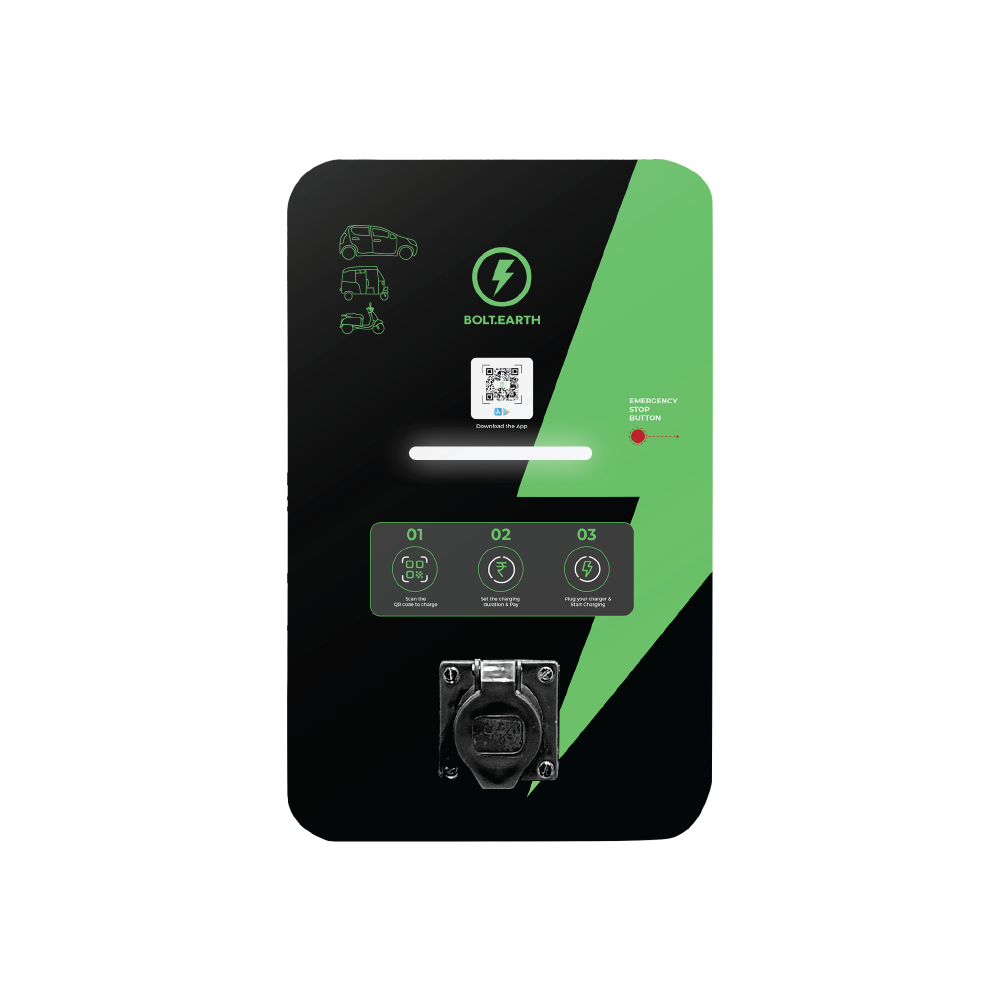EV Technology in 2023: Current Trends and Future Prospects
Raghav Bharadwaj
Chief Executive Officer
Published on:
16 Nov, 2023
Updated on:
24 Nov, 2025

Growing climate change concerns, coupled with technological advancements in the automotive industry, have fueled the growth of electric vehicles (EVs). In the first half of 2023, there was a 40% increase in global EV sales compared to the previous year. By 2030, EVs will constitute 35 to 40% of all new car sales. However, this mass adoption depends on innovations in charging infrastructure, smart grids, and battery technology.
To provide a realistic perspective on the EV trends in India, this article answers three key questions:
- What are the top technology trends shaping the EV industry in 2023?
- How are current challenges impeding the progress of EV technology?
- Why are proposed solutions vital to overcoming these challenges?
Today’s EV Technology
EVs present an eco-friendly and cost-effective alternative to traditional vehicles, offering a solution to reduce congestion and pollution in Indian cities. These modern vehicles come equipped with high-tech features, further enhancing the driving experience and contributing to a sustainable urban environment. Consequently, the Indian government is supporting EV adoption, and the private sector is building innovative EVs to suit India’s roads and traffic conditions.
Battery technology innovations play a key role in the EV market. Advancements in lithium batteries have reduced EV battery costs by 90% since 2008, making EVs more affordable, providing more mileage, and reducing range anxiety. Advancements in EV chargers and smart grids further boost consumer interest. Favorable government policies, greater EV benefits, and rising consumer demand have all spurred the global EV market.
In India, Tata Motors is in the lead, with an 86% market share from its Tigor and Nexon EV models. Other popular models include MG Motor’s MG ZS EV at 9% and Hyundai’s Kona at 1.6%. In the two-wheeler EV sector, Ola Electric leads a 27.2% market share, followed by TVS Motor at 19.3% and Ather Energy at 14.6%. Mahindra & Mahindra dominates the three-wheeler EV market, followed by Piaggio Vehicles.
Moving on to the global EV market, Tesla leads with a market share of 20% in Q2 of 2023. BYD Auto follows with a market share of 15% and Volkswagen with 7%. The remaining 58% of the market share is highly fragmented among many local and international companies.
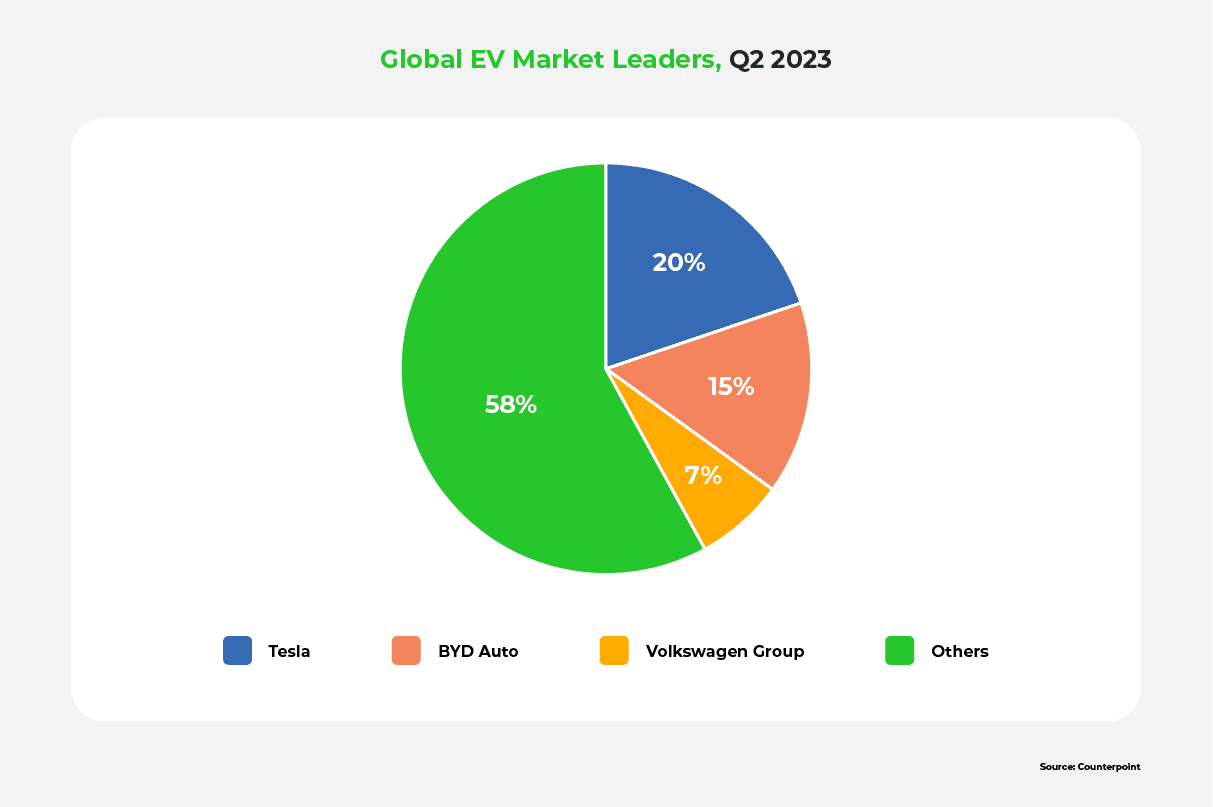
When it comes to EV two-wheelers, the top players are AIMA Technology, Ather Energy, Hero Electric, Jiangsu Xinri, and Yadea Group Holdings.
A quick comparison between the Indian and global markets shows that in India, there’s room for more players and models. This also signifies more opportunities for global players who can enter this lucrative market for a share in the EV pie.
Why Discuss EV Breakthroughs Now?
2023 is a pivotal year for EVs, marked by an influx of new models and increased demand and awareness. By discussing EV shifts in India now, stakeholders have a chance to actively shape the future of mobility. Furthermore, these advancements are backed by potentially time-sensitive regulatory policies that create a conducive environment to improve battery technology and integrate renewable energy sources; this is an ideal moment to boost EV adoption, create economic opportunities, and provide environmental benefits.
Key Technology Trends Shaping Electric Vehicles in 2023
A lot is happening under the hood, from smart systems to power-packed batteries. Here are some key technology trends shaping EVs in 2023.
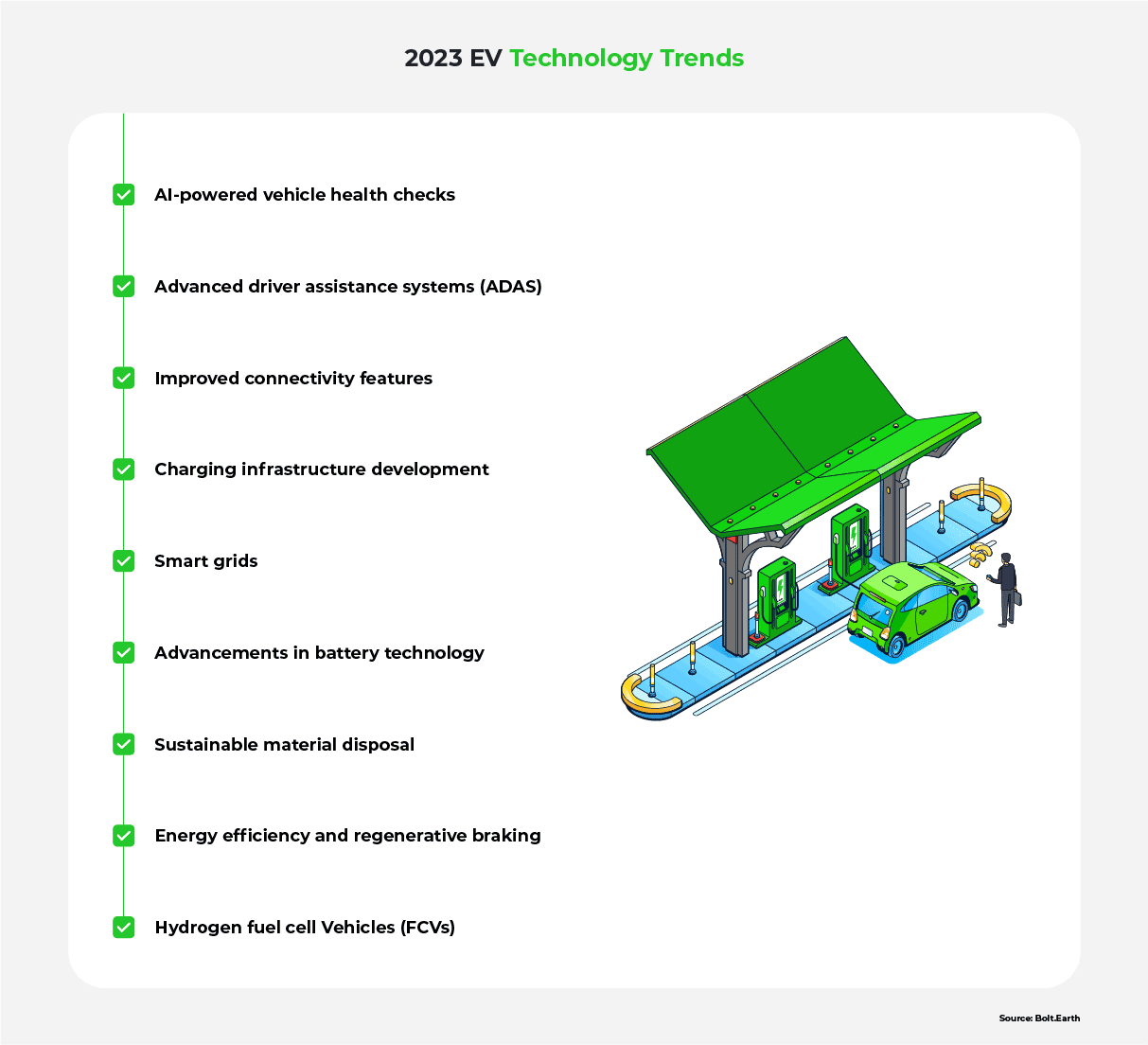
AI-Powered Vehicle Health Checks
AI systems are revolutionizing EV safety and performance by gathering sensor data and analyzing anomalies. In particular, these systems gauge EV and battery health, so that owners and fleet operators can take proactive actions to avoid costly repairs. A good example is the vehicle intelligence system developed by Delhi-based Vecmocon Technologies and funded by the Indian Department of Science and Technology; it features keyless entry, predictive maintenance, remote diagnostics, fleet management, and user-adaptive algorithms to ensure a reliable and safe EV driving experience.
Advanced Driver Assistance Systems (ADAS)
ADAS refers to a collection of technology-driven features, consisting of sensors and controllers, that enhance driving safety and comfort by monitoring the external environment for the presence of other vehicles and pedestrians. This information is used to provide real-time suggestions, including emergency braking and parking assistance. ADAS can also detect driver drowsiness to improve safety.
Improved Connectivity Features
The shift to software-defined vehicles (SDVs) emphasizes seamless connectivity for a smooth driving experience. Vehicle-to-everything (V2X) technology enables software controllers to send and receive information — including remote diagnostics, location-based services, current charge level monitoring, and over-the-air software updates — to internal and external components.
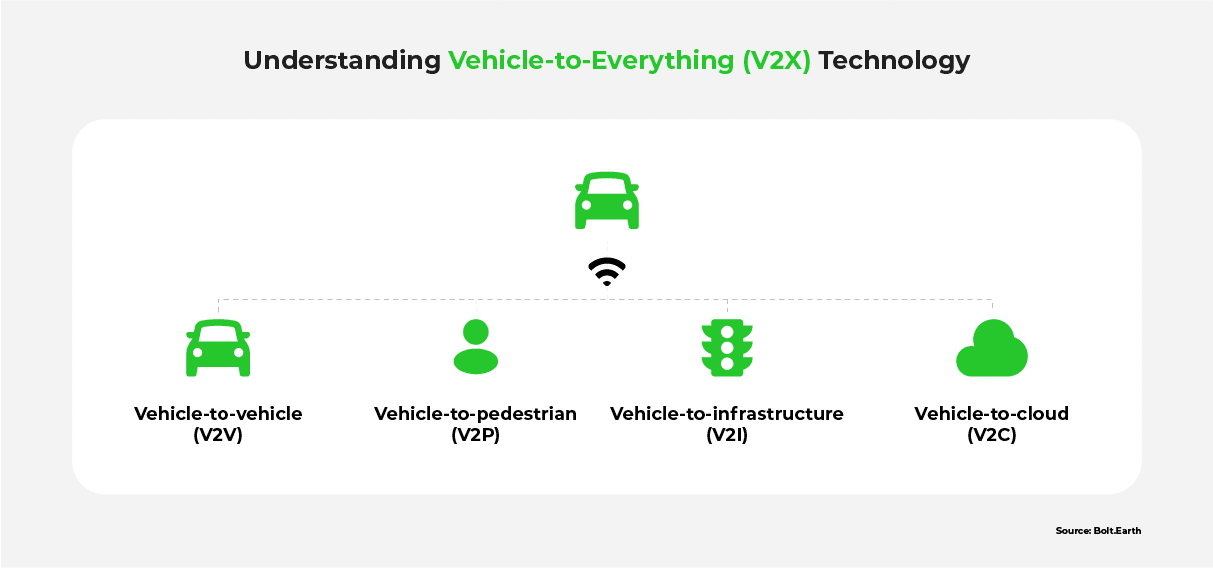
Charging Infrastructure Development
Currently, the charging market in India is highly fragmented, with four different charging standards: Bharat AC-001, Bharat DC-001, CHAdeMO, and CCS. The existing infrastructure is located in cities, although public-private partnerships are working to build many stations across highways. Efforts to address incompatibilities in charging standards include Bolt.Earth’s universal chargers. Furthermore, the emergence of fast charging technology is reducing charging time, leading to optimized usage of existing facilities and greater return on investment (ROI) for infrastructure developers.
Smart Grids
Smart grids enhance EV charging efficiency and improve load balancing, ensuring a smooth charging experience for users. Innovations like bi-directional charging and vehicle-to-grid (V2G) technology allow EVs to function as energy repositories that can return unused energy to the grid, making them a more sustainable option.
Advancements in Battery Technology
The demand for high-performance EVs with longer mileage is fueling innovation in battery technology. Solid-state batteries, which use solid electrolytes over liquid or gel, promise efficiency, durability, and higher energy density that has higher energy storage. Similarly, lithium-sulfur batteries offer greater energy storage at reduced costs. Sodium-ion (Na-ion) batteries, which are cost-effective but less-than-ideal for long distances, are currently being explored for e-scooters. Additionally, advancements in battery recycling technologies are helping extend battery lifespans and reducing operational costs.
Sustainable Material Disposal
The growing awareness of environmental damage and the efforts going into solid waste management will extend to EVs. It’s estimated that 100 million EV batteries retire in the next decade, creating opportunities in battery recycling.
Research and development grants from the EU’s European Battery Alliance and the United States’ National Science Foundation Phase II are driving the battery recycle trend. Stringent decarbonization targets are also pushing EV automakers to consider using recycled batteries, as it can have four times less carbon footprint than new ones.
Energy Efficiency and Regenerative Braking
EV makers are looking to optimize energy usage and efficiency, as it can directly address problems like range anxiety. The regenerative braking trend contributes to energy efficiency as it captures the kinetic energy released during braking. When the vehicle decelerates or comes to a standstill, a certain amount of kinetic energy is released, and this is captured and reused for running the EV. While this trend is in the nascent stages, it is expected to pick steam in 2023 and beyond.
Hydrogen Fuel Cell Vehicles (FCVs)
The push to make EVs more environment-friendly is fueled by renewable energy usage. Along with solar, wind, and hydro, there has been a growing interest in hydrogen fuel cells. As the name suggests, hydrogen is the fuel, and the emission is only water and warm air. Though FCEVs are in the early stages now, a lot of research is happening in this field. Countries like India are even looking to commercialize these hydrogen fuel cells in the coming years.
These exciting trends chart a path to a greener and smarter future. However, to realize their full potential, stakeholders must tackle some important challenges.
Obstacles to Enhancing EV Technology
The road to enhanced EV technology is complicated by several technical, regulatory, and economic factors. The EV industry must address these before it can truly harness the power of emerging technologies.
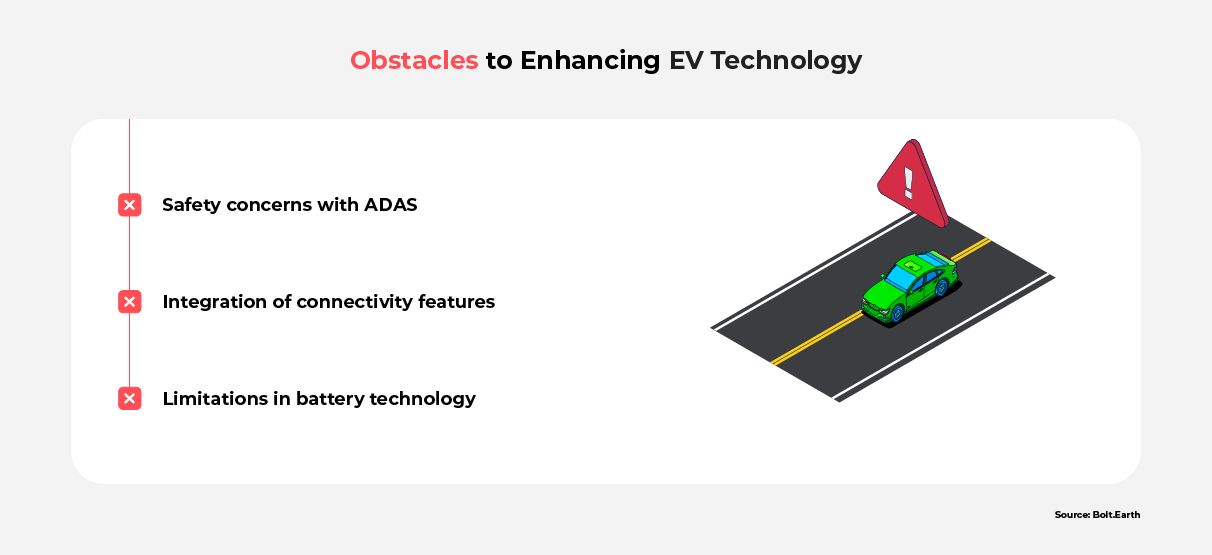
Safety Concerns With ADAS
ADAS’ safety features may not always be reliable; low light, weak network signal areas, and inclement weather conditions can lead to false alarms, or cause ADAS to miss serious issues. Furthermore, since ADAS relies heavily on GPS systems, outdated data can reduce efficacy, or even provide inaccurate information.
Integration of Connectivity Features
Relying on EV software for connectivity creates a need for compatible protocols and hardware to ensure seamless communication. Nevertheless, the current landscape is fragmented; there are multiple communication protocols, which can prevent software components from effectively exchanging information. Furthermore, EV users must search for charging locations that have hardware compatible with their specific vehicles. Lastly, concerns about data security and privacy affect connectivity among EV components. These issues impact remote diagnostics and smart navigation, reducing user experience and increasing maintenance costs.
Limitations in Battery Technology
Although there have been remarkable developments in battery technology in the last few years, it still lags behind fossil fuels in energy density. Furthermore, insufficient charging stations and prolonged charging times continue to restrict EVs’ usability.
Although these challenges are substantial, the EV industry is already taking steps to overcome them.
Resolving Current Challenges in EV Technology
In order to keep making progress, the EV industry must resolve challenges involving safety, range, and battery technology. Industry stakeholders are working together to address these issues with research, investments, and regulatory support.
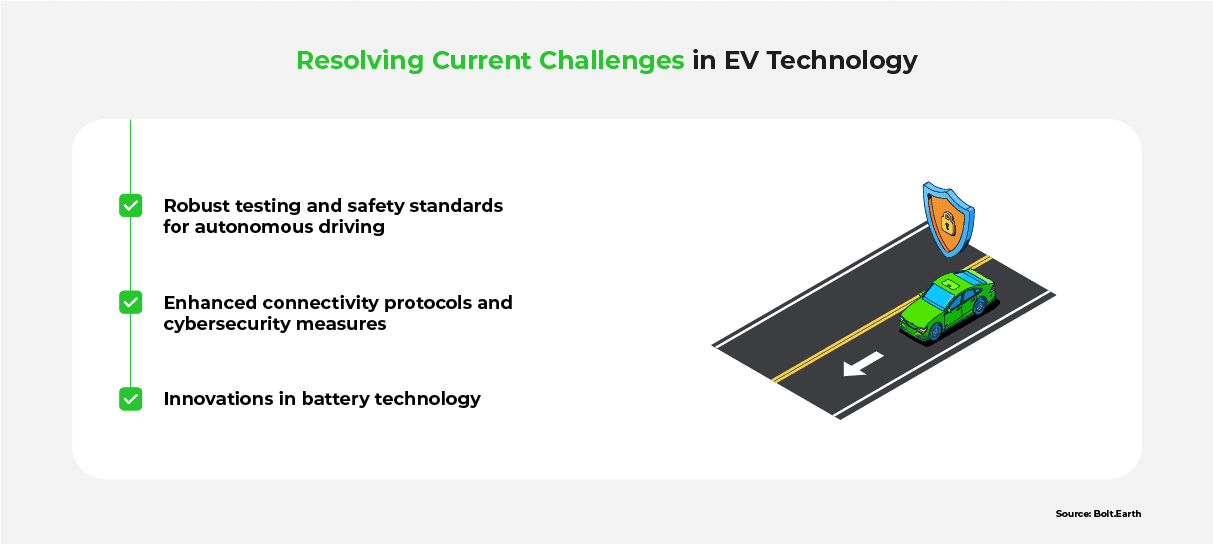
Robust Testing and Safety Standards for Autonomous Driving
Rigorous testing is required to ensure a safe driving experience, especially for ADAS. Automakers and technology companies must integrate real-world trials with virtual simulations and data analysis to identify shortcomings, enhancing user trust in ADAS-equipped EVs.
Enhanced Connectivity Protocols and Cybersecurity Measures
Cybersecurity is essential to all communication and connectivity protocols. Automakers must consider using upgraded protocols, encrypted communication channels, and proven authentication mechanisms to ensure confidentiality among car components, EVs, and smart grids. Secure connectivity is required to prevent cyberattacks and safeguard sensitive user data.
Innovations in Battery Technology
Battery technology, which is undergoing ongoing research, is central to EVs. Developing solid-state and lithium-sulfur batteries can increase EV mileage, and advancing fast-charging technologies reduces charging time. For example, the Swiss-based technology company Morand has developed a fast charger that can charge EVs to 80% in 72 seconds, although it is only suited to small-range cars.
These solutions pave the way for a future where autonomous driving, seamless connectivity, and cutting-edge batteries work together to boost EV users’ driving experience.
Imagining the Future of Transportation
Emerging trends in battery technology and ADAS are not just drivers of innovation; rather, they can reshape the future of the EV industry by creating user-friendly features, improved range, and faster charging solutions, making EVs more attractive to a wider customer base. By championing EV adoption, stakeholders can make strides towards improving air quality and reducing carbon emissions.
If harnessed correctly, technology trends can pave the way for a greener, cleaner, and more electrified future.
Embrace the Electrifying Future: Drive the Change Today!
In 2023, technological trends such as AI-powered health checks, seamless connectivity, smart grids, improved charging infrastructure, and powerful batteries are driving the EV industry. Keeping up with these trends isn’t just a choice; it’s a roadmap for a cleaner future. Let’s embrace the electric shift and drive the change toward a greener tomorrow!
To learn more about EV trends in India, please see the FAQ and Resources sections below.
FAQ
How is the global adoption of electric vehicles progressing?
The global adoption of EVs is steadily advancing. Sales and registrations of EVs have been on the rise, driven by factors like government incentives, environmental awareness, and technological advancements. EV sales reached a near-record high of 1.26 million in June 2023. This growth is attributed to improved battery technology, expanded charging infrastructure, and increased consumer interest in sustainable transportation.
Who are the major players in India’s electric vehicle market?
The Indian EV market’s major players are Tata Motors, Ola Electric, and Mahindra & Mahindra. These companies have strategically positioned themselves to capitalize on India’s growing demand for EVs. With innovative product offerings, competitive pricing, and collaborations with local stakeholders, these players have emerged as influential contributors to the expansion of India’s EV market.
What role does autonomous driving play in the future of electric vehicles?
Autonomous driving plays an important role in shaping the future of electric mobility. It integrates artificial intelligence and advanced sensors to enhance safety, reduce traffic congestion, and optimize energy efficiency. As self-driving technology advances, it could enable shared autonomous EVs, reducing urban pollution.
How is the charging infrastructure developing to support the expanding electric vehicle market?
The charging infrastructure is rapidly evolving to accommodate the growing number of EVs. Governments, private companies, and communities are driving the installation of charging stations, especially in urban centers and along highways. This expansion is fueled by increased EV adoption, government incentives, and environmental concerns, all contributing to a more accessible and convenient charging network.
What sustainability initiatives are being taken in the electric vehicle industry?
Many sustainability initiatives are happening in the EV industry. Manufacturers prioritize eco-friendly materials, including polymers or composites of carbon fibers, for EV production, integrate renewable energy in charging stations, and create battery recycling programs. Together, all these initiatives are contributing to a greener EV ecosystem.
Resources
LinkedIn: Top 5 Electric Vehicle Technology Trends for 2023
Get detailed insights on some cutting-edge trends in EV technology.
EV Magazine: Trends in electric vehicles: what can we expect in 2023?
Discover predictions for the EV industry’s immediate future.
InteractOne: The Tech & Trends Shaping Automotive in 2023
Learn about some key technological advancements and trends.
United States Department of Energy: Electric Vehicle Charging Infrastructure Trends from the Alternative Fueling Station Locator
Find out how EV charging infrastructure trends are shaping the industry.
International Council on Clean Transportation: Annual Update on the Global Transition to Electric Vehicles
Gain an understanding of the global EV market.

Feb 19, 2026 • EV Charging Infrastructure
EV Charging for Quick Commerce Fleets in India: Scaling Sustainable Delivery
Read More
Feb 17, 2026 • EV Charging Infrastructure
The Psychology of EV Charging: What EV Drivers Want at a Charging Station
Read More
Feb 12, 2026 • EV Charging Infrastructure
What Is the Real Bottleneck in Scaling India’s EV Charging Network?
Read More

